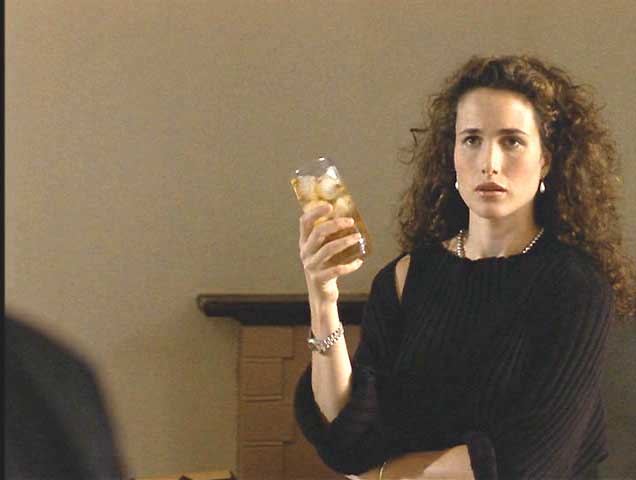
 |
||
|
Major Member
 加入日期: Oct 2004
文章: 110
|
Sex, Lies and Videotapes
     
__________________
  “才德全盡,謂之聖人;才德兼亡,謂之愚人。德勝才,謂之君子;才勝德,謂之小人。” |
|||||||
|
|
|
Major Member
 加入日期: Oct 2004
文章: 110
|
a good review
Magill's Survey of Cinema
06-15-1995 SEX, LIES AND VIDEOTAPE is a provocative examination of the complexities of emotional and physical intimacy. The basic structure of its story is a familiar one: that of an outsider whose arrival disrupts the structure of an existing relationship or group, forcing its members to reexamine their lives and confront long-ignored truths. It is the way in which Soderbergh makes use of this structure--and the twists he gives it--that make the film a compelling and original work. Ann provides the film with its emotional center. She is a woman who, seen from the outside, would appear to have an enviable life, yet it is apparent from the film's first scene that her inner life is far from placid or content. Graham's arrival brings to the surface the emotions that Ann has suppressed, emotions that have manifested themselves in the obsessive anxieties that she relates to her therapist. Her life with John is a tissue of lies, a hollow fabrication in which a carefully decorated home and an upwardly mobile lifestyle serve as substitutes for a sense of genuine love and commitment. For John, Ann represents the sort of wife that a successful young attorney ought to have; she is cool, beautiful, and circumspect in her behavior. Yet her loss of interest in him sexually troubles him very little; his interest in her is as a wife not a lover. It is Cynthia who attracts him and whose uninhibited sexuality excites him, although her lifestyle would no doubt render her unacceptable to him as a wife. It is also clear from a conversation John has with a friend that Cynthia is not the only woman with whom he has betrayed Ann. A wedding ring, he confides, acts like a magnet where women are concerned. John is unquestionably the film's least sympathetic character; he is a self-satisfied hypocrite whose sharp comeuppance at the film's conclusion is emotionally satisfying, if dramatically somewhat weak. Cynthia is one of the film's most intriguing characters. An independent, outspoken young woman whose physical hold on John is so strong that he repeatedly cancels appointments with an important client for afternoon visits to her apartment, she is a complex mixture of self-assurance and longstanding resentment toward her sister. It becomes apparent that in their childhood relationship, she found herself relegated to the role of "bad sister" next to the pretty, popular, well-behaved Ann, a role she continues to play with both relish and a good deal of bitterness. Shocking Ann with her language, her attitudes, and her behavior is a double-edged sword that brings her both satisfaction and an aura of toughness that will not permit emotional intimacy. Graham is the story's wild card, a character whose lifestyle and behavior offer a threat to the status quo. Ann and Cynthia are changed by their encounters with him as they confront the truth of their own lives, while John finds his life changed against his will by the decisions of the other characters. What Graham adds to the pattern into which their lives have fallen is honesty, an ingredient missing in the behavior of all three. A one-time compulsive liar, Graham has resolved to live with ruthless honesty--much as an alcoholic resolves to live without drinking, and the effect of his decision is disconcerting. He is a man who says exactly what he thinks and answers even the most intimate questions with a complete lack of dissimulation, a practice that repeatedly takes those around him by surprise. This level of openness is perhaps what has persuaded the women on his earlier videotapes to trust him; it is certainly at the heart of both Ann's and Cynthia's responses to him. It is the experience of making the videotapes that has a transforming effect on the two sisters. For Cynthia, the extreme emotional honesty and the level of openness and trust that it requires offer her a glimpse of another side of her own nature that gradually begins to appear in her subsequent behavior. Her anger toward Ann begins to subside, and she makes a few hesitant overtures of friendship, while her relationship with John no longer offers her the same degree of satisfaction. For Ann, the confrontation with the emotional emptiness of her own life allows her to see that Graham, too, is living in a state of alienation and prompts her to reach out to him through his own video camera. The twist that Soderbergh gives his story is that Graham--the outsider, the intruder--is changed by its events as well. When Ann turns the camera on him, he says helplessly, "this wasn't supposed to happen," but he is forced at last to confront his own self-imposed isolation and to recognize that perhaps honesty and intimacy are not mutually exclusive. Despite his seeming self-sufficiency earlier in the story, it emerges during the taping that he may have instigated the changes in his life as a means of proving his worth to a former girlfriend, a ridiculous plan, as Ann is quick to point out to him. Underneath his carefully constructed existence as a loner, Graham is in reality an extremely vulnerable young man, and his brutal encounter with John, who destroys the privacy of his world by viewing Ann's tape, has a devastating effect on him. At the film's close, he has, in effect, reentered society by establishing a relationship with Ann. Any film that deals so exclusively with issues of emotion and its characters' inner lives must necessarily rely heavily on the skills of its actors for a large measure of its success or failure. SEX, LIES AND VIDEOTAPE has three exceptional performances in the work of Andie MacDowell, Laura San Giacomo, and James Spader. (Peter Gallagher is well cast as John, but the role offers less opportunity for a display of acting talent because of the character's own shallowness.) MacDowell makes Ann by turns amusing, edgy, and dreamily bewildered as her years of self-denial begin to crumble, while San Giacomo brings an underlying humanity to what could have been an unsympathetic role. The character of the enigmatic Graham is a difficult one, and Spader manages, in a quiet, controlled performance, to hint at the troubled emotions that will eventually emerge. Soderbergh has given his film the look and aura of a documentary, a technical choice in keeping with the theme of Graham's use of videotape as a substitute for emotional intimacy. The film consists almost entirely of conversations between its various characters, and its script is witty, intelligent, and precise in the ways in which it establishes each character's voice. That SEX, LIES AND VIDEOTAPE is Soderbergh's first feature makes his accomplishment especially impressive; he is a filmmaker whose future work will be awaited with much anticipation. (Reviewed by Janet Lorenz.) Review Sources: American Film: Magazine of the Film and Television Arts. XIV, April 1989, p. 76. Chicago Tribune. August 11, 1989, VII, p. 37 Films in Review. XL, October, 1989, p. 482 LA Weekly. August 4, 1989, p. 29 Los Angeles Times. August 4, 1989, VI, p. 1 The New Republic. CCI, September 4, 1989, p. 26 New York Magazine. August 7, 1989, p. 40 The New York Times. August 4, 1989, p. C12 The New Yorker. LXV, August 7, 1989, p. 73 Newsweek. CXIV, August 7, 1989, p. 61 Time. CXXXIV, July 31, 1989, p. 65 Variety. CCCXXXIV, February 1, 1989, p. 20 The Wall Street Journal. August 3, 1989
__________________
  “才德全盡,謂之聖人;才德兼亡,謂之愚人。德勝才,謂之君子;才勝德,謂之小人。” |
||
|
|